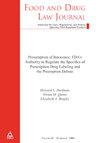生物制剂监管的早期发展。
IF 0.3
4区 医学
Q4 FOOD SCIENCE & TECHNOLOGY
Food and drug law journal
Pub Date : 2016-01-01
引用次数: 0
摘要
本文是公共卫生服务(PHS)根据1902年《生物制剂控制法》采取的政策立场和法律解释的历史。PHS通常对该法案的范围解释得很狭隘,因为它没有权力拒绝无效生物制剂的销售许可,并希望尽量减少获得政府许可的无价值药物的数量。此外,PHS实施了法案未明确授权的重要监管策略。本文章由计算机程序翻译,如有差异,请以英文原文为准。
Early Developments in the Regulation of Biologics.
This article is a history of the policy positions and legal interpretations adopted by the Public Health Service (PHS) under the 1902 Biologics Control Act. PHS generally interpreted the scope of the Act narrowly because it lacked authority to deny marketing licenses for ineffective biologics and wanted to minimize the number of worthless drugs with the imprimatur of a governmental license. In addition, PHS implemented important regulatory strategies not expressly authorized by the Act.
求助全文
通过发布文献求助,成功后即可免费获取论文全文。
去求助
来源期刊

Food and drug law journal
医学-食品科技
CiteScore
0.20
自引率
50.00%
发文量
0
审稿时长
>36 weeks
期刊介绍:
The Food and Drug Law Journal is a peer-reviewed quarterly devoted to the analysis of legislation, regulations, court decisions, and public policies affecting industries regulated by the U.S. Food and Drug Administration (FDA) and related agencies and authorities, including the development, manufacture, marketing, and use of drugs, medical devices, biologics, food, dietary supplements, cosmetics, veterinary, tobacco, and cannabis-derived products.
Building on more than 70 years of scholarly discourse, since 2015, the Journal is published in partnership with the Georgetown University Law Center and the O’Neill Institute for National & Global Health Law.
All members can access the Journal online. Each member organization and most individual memberships (except for government, student, and Emeritus members) receive one subscription to the print Journal.
 求助内容:
求助内容: 应助结果提醒方式:
应助结果提醒方式:


